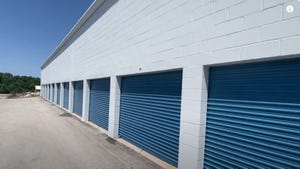Owners of expensive recreational vehicles, collectible cars and boats are turning to a relatively new concept in self-storagecondominiums. After shelling out big bucks for a big toy, these owners dont balk at paying $60,000, $75,000 or even $100,000 for a secure place to keep it. Five storage experts offer their views on this exciting new trend.
October 13, 2008
Owners of expensive recreational vehicles, collectible cars and boats are turning to a relatively new concept in self-storage—condominiums. After shelling out big bucks for a big toy, these owners don’t balk at paying $60,000, $75,000 or even $100,000 for a secure place to keep it. Five storage experts offer their views on this exciting new trend.
Wes Pettit, Storage Condo America
Although the concept of storage condominium ownership is new to Connecticut, the storage condo is rapidly becoming the storage solution for the future, says Wes Pettit, developer for Storage Condo America in Windsor Locks, Conn. Storage Condo America is a storage condominium facility developed by Park Place Storage Condominiums LLC. The company specializes in creating large storage condominium units for personal and commercial uses. Pettit’s background includes construction and operation of traditional self-storage facilities and commercial property development.
“No one can predict the future, but if you look at the history of inflationary trends it’s easy to realize that rents, in general, do not come down,” Pettit says. Although multiple advantages exist for the customer who buys a storage condo, two of the largest are elimination of monthly rents and appreciation of real property that can be later sold. Storage condos can also be listed as an asset on personal balance sheets. Plus, the unit owner has the freedom to install amenities and property improvements to accommodate his needs.
The advantage to the developer is the elimination of long-term responsibility, including staff for the property, Pettit says. Once units are sold, property management comes under the responsibility of an association.
Caesar Wright, Mako Steel Inc.
“The model of condominium self-storage has emerged over past three or four years,” says Caesar Wright, president of Mako Steel Inc. in Carlsbad, Calif. Mako designs, supplies and installs steel buildings for the self-storage industry nationwide.
Most RV-storage facilities sit on 6 to 10 acres of land, but in Southern California, those 6 to 10 acres are worth $12 million to $20 million, Wright says. Many mom-and-pop operations are cashing in and selling their properties to RV/boat storage developers.
While construction is not much different from regular self-storage with the exception of amenities, condos often run into resistance from cities, Wright says. “The condo concept is a different animal than self-storage,” he says. “Many cities are generally not favorable to this type of storage.” City officials question what’s in it for them because the city doesn’t receive any sales tax revenue from the product or income tax derived from use of the labor pool with storage condos. Often, developers must propose something unique or pay for a street or public-service change to gain approval.
Ted Deits, Eucalyptus at Beaumont
The storage condo market is more of a luxury market, says Ted Deits, owner and developer of Eucalyptus at Beaumont, Southern California’s first-of-its-kind RV storage condominium. “People will spend more money to own the space for their boats and RVs,” he says.
Deits conducted a due diligence survey of about 1,200 potential customers to find out what they wanted. Among the items were a variety of unit sizes and door widths, customizable interiors, restrooms, showers, dump stations, a playground, wash bays, ice machines, a 60-amp for each unit, propane tanks, Wi-Fi availability and valet service.
Area demographics for condos are also different than traditional self-storage. Most of the initial buyers for Eucalyptus live more than an hour away with some as far as Australia and Hawaii.
Eucalyptus at Beaumont pre-sold 50 percent of its units in two initial offerings before construction even began. The $10 million property offers 108 condo units priced between $55,000 and $182,000, and provides the extras many owners of luxury vehicles expect. There are five standard unit sizes. Unit depth ranges from 35 feet to 50 feet, and all have 14-foot door heights. Widths range from 11 feet to 26 feet with 10- to 20-foot-wide sectional doors. Some units can be combined to create a unit up to 100 feet deep.
“You can build a condo facility but still rent the units, but you can’t build a rental facility and sell the units,” Deits says.
Gary Morris, Premier Storage Condos

“Building a storage unit makes sense,” Morris says. “People can downsize their homes and have somewhere safe to store their toys but, at the same time, build equity in the unit.” Owners know if they sell their RV they can rent their unit to others or sell the unit on the open market.
Premier offers several unit sizes from 14-by-30 to 22-by-40 at a cost of $125 per square foot. Every unit includes fire sprinklers, electrical outlets, fluorescent lighting and individual door alarms. The large sectional doors are sealed on all four sides. Driveways are 56 feet wide to allow easy parking of these large vehicles.
The property has 24-hour access with alarm monitoring and 24-hour video protection. Security is supplied by PTI Integrated Systems. All buildings are plumbed for water so customers can wash vehicles in front of their units before storing them. The facility features an RV-waste dump and separate bathrooms with showers for men and women.
Construction of the 213,425-square-foot facility began in early January by the Ayres Group General Contractor. As of this writing, the facility was 90 percent sold. The Ayers Group is already planning a 530-unit complex in west Phoenix.
Jim Stratton, Real Estate and Development Consultant
Two market conditions support the development and sale of storage condos—an overall shortage of vehicle-storage space and high rents for quality vehicle storage, says Jim Stratton, a real estate and development consultant based in New Orleans. The demand for recreational-vehicle storage is still growing based on increased sales of vehicles and growing parking restrictions, he says. As of 2007, the number of RV and boat owners using commercial storage is approximately 11 percent.
Vehicle storage can be divided into three segments: owners of RVs, boats and other vehicles, small-business owners and investors. The first two are the two primary end-users of storage. Small-business owners are attracted by the design of the vehicle-storage unit, which is very similar to the design of typical office/warehouse space, and the opportunity to own rather than rent.
The developer has the option to restrict buyers to just those intending to store vehicles, but many have found vehicle storage and small business coexist quite well, says Stratton, who has provided market research and feasibility studies for real estate developers including self-storage for more than 20 years.
“The storage-condo market might represent a profitable niche in many locales,” Stratton says. “But careful study of demand, supply and financial feasibility is essential to success.”
You May Also Like





